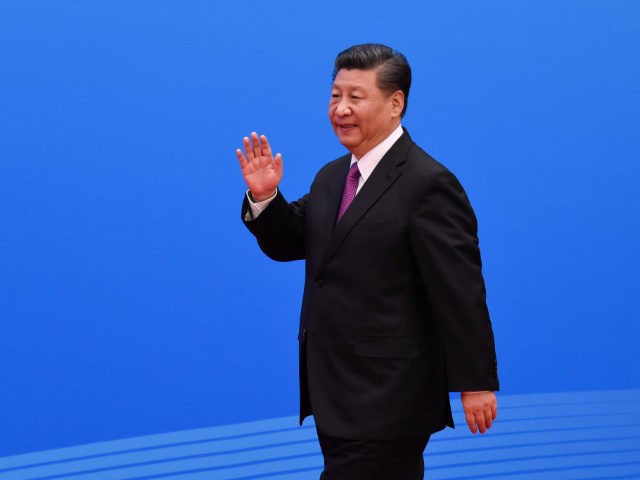Chinese Communist Party leader Xi Jinping continued his “Long March” propaganda tour on Monday by visiting a memorial to the beginning of that 4,000-mile retreat by the Red Army, touring an old military base used by Communist forces and then visiting a People’s Liberation Army (PLA) military college on Tuesday.
Xi has been working overtime to resurrect the memory of the “Long March,” which is essentially about Chinese Communists banding together and prevailing in the face of overwhelming adversity a century ago, to rally modern Chinese against the United States in the current trade war.
China’s state-run Xinhua news service reported Xi placed much emphasis on political reliability in his remarks at the military academy:
Military education should meet the requirements of combat, the needs of the armed forces and the demands of future missions, said Xi, also general secretary of the Communist Party of China Central Committee and chairman of the Central Military Commission.
He told military academies and schools to have a strong political underpinning, clarify their direction, advance reforms and improve education quality.
Arriving at the Army Infantry College on Tuesday morning, Xi came to the training ground to observe cadets tackle military obstacle courses.
Leaving the training ground, Xi visited an institute dedicated to the research on revolutionary history and stressed the passing on of revolutionary traditions.
When briefed about the work of the college, Xi stressed the need to follow the right political direction and strengthen Party leadership and Party building.
According to Xinhua, Xi remembered to advise the cadets to take a break from all that party-building to actually win battles if they were called upon to fight, and concluded by inveighing against unnecessary bureaucracy, which seems a little misguided coming from a Communist strongman. Communism is a questionable choice of ideology for people who severely dislike bureaucracy.
Xi also endorsed self-reliance during his outing on Tuesday, which is a consistent rhetorical tic of communism — “self-reliance” is the literal translation of the name of North Korea’s state ideology. Communist leaders like to talk about “self-reliance” because it allows them to pin the blame for failure on the people beneath them, who failed because they did not do their part to achieve collectivist success.
Talking about self-reliance is also a way for collectivist leaders to assert their mighty nations do not require trade and commerce with ideologically impure foreigners.
Rhapsodizing about Chinese innovation and self-reliance helped Xi deflect persistent Western allegations of technology theft — allegations the Chinese on Monday accused the U.S. of fabricating to use as a “political tool,” a “weapon to contain other countries,” and an excuse for “bullying the world.” The U.S. Department of Homeland Security issued a warning that China might be using drones to spy on American companies and steal their data.
“Technological innovation is the root of life for businesses. Only if we own our own intellectual property and core technologies, then can we produce products with core competitiveness and won’t be beaten in intensifying competition,” Xi said.
The venue for these remarks was a rare earth minerals processing company, whose products Xi hailed as “an important strategic resource, and also non-renewable.”
Beijing’s latest gambit in the trade war involves threatening to cut off exports of rare earths to the United States, which obtains about 80 percent of its supply of those vital materials from China.
Government officials have not explicitly threatened to cut off rare earth exports yet, but they are lately taking every opportunity to remark upon how vital those exports are to foreign industries. They are also floating the idea of curtailing China’s huge purchases of natural gas from the United States.
U.S. market analysts believe the Trump administration’s blacklist of Chinese products is likely to expand, with the next likely targets including Hikivision, a top manufacturer of surveillance equipment.

COMMENTS
Please let us know if you're having issues with commenting.